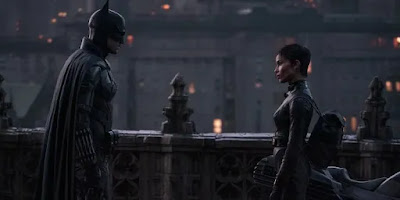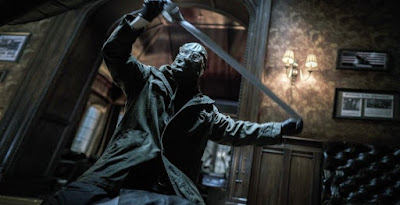Even after all these years of superhero movies, Batman remains perhaps the most uniquely cinematic. Take Bruce Wayne, the Caped Crusader, striking fear in the hearts of Gotham City’s villainy, all the way back to his early comic book origins. He’s always been at the intersection—thematically, visually, tonally—of gangster pictures, German expressionism, and film noir. He’s accrued Art Deco shadows and grungy urban doom. It’s sometimes dialed up to goofy midcentury camp (hello, Adam West), sometimes dialed down to mumbling Michael Mann skyscraper canyons (howdy, Christian Bale), sometimes drawn out in luxuriously complicated Saturday morning cartoons (the Animated Series and Beyond) or stretched out in gargantuan backlot artifice (holy Tim Burton, Batman!). But it’s always recognizably this stew of influences, plus his costume a simple silhouette with silent film recognizability. His gadgets and gumshoe approach to avoiding the pain of the orphaned billionaire boy grown up collide with the sick and sicker in his crumbling home metropolis. Even the bad Batman movies are still often fun visions of this world, engaging as pulpy interiority blown out to blockbuster dimensions. The latest, directed and co-written by Matt Reeves, and starring Robert Pattinson as the angular chin and brooding eyes hidden within the cape and cowl, is maybe the most downbeat and dreary version yet, once again stumbling down dark alleys in pursuit of something like justice that’s forever out of reach.
There’s something pessimistic at the core of this hero. When talking DC’s icons, Superman is what we hope America can be. Batman is who we fear America is. No high-flying truth and justice here. Bruce Wayne and his alter ego can suit up and punch villains every night, but the sad truth of capitalist corruption and crime—a city where the cops and robbers are often one and the same, and everyone from the Mayor to the District Attorney to the mob bosses are all part of the same pool of dark money and influence—just won’t budge. So Reeves, an intelligent big budget filmmaker coming off of two interestingly textured and thoughtful Planet of the Apes pictures, visualizes these ideas by making his Gotham constantly overcast, usually raining, generally nocturnal. (It has to be a close cousin to the unnamed city in Fincher’s compellingly gross serial killer thriller Se7en.) There’s always a cloud hanging over the scenes, and the slow, patient drip of detective information about the central mystery takes precedence over slam-bang action. That makes the one fun car chase all the more thrilling, a welcome sparking rattling roar of an engine revving to life as the Batmobile makes its long-awaited appearance tearing off after a slimy bad guy. And it leaves the proceedings to move at a steady trudge, resisting the usual fanfare. To its credit, this downbeat affair that creaks by at a long three-hour run time, is trying for something genuinely wiggly and unsettling in the middle of so much iconography and cliche.
The whole thing kicks off with the murder of the mayor by a mysterious killer known only as The Riddler (Paul Dano). More victims follow. At each, he’s recording viral videos and leaving taunting clues in greeting cards at the scene for lead detective Gordon (Jeffrey Wright) to give to The Batman. Together, the two men hunt for clues and chase down leads. Sometimes they cross paths with a slinky nightclub waitress Selina Kyle (Zoe Kravitz), whose cat burglar outfit is the best since Pfeiffer’s. She has her own reasons to investigate the goings-on at a club run by the town’s top gangster (John Turturro) and his waddling underling (Colin Farrell buried in a fat suit). Reeves leans into the tight-lipped pathos of these pathetic, wounded characters creeping around the shadows of society, looking for leverage over each other in an attempt to make things a little brighter by any means necessary. Unlike the usual comic book dichotomy—or pat mirroring that leads villains to the inevitable “we’re two sides of the same coin” monologuing—this movie makes clear that everyone’s inevitably shaped by societal forces beyond their control. Batman, Catwoman, The Riddler, Detective Gordon—all are willing to bend rules and skulk around to reshape Gotham toward their ends, some for slightly better, some for way worse. There’s never a sense anyone will actually unambiguously triumph. Michael Giacchino’s pounding score takes that cue, edging along Elfman horns while plucking some “Tubular Bells.”
Here’s a city possessed with an urban rot that no one can escape. This makes for a brooding, brutal, cynical, ice-cold, paranoid and conspiratorial picture. It’s not fun, exactly, but from its opening montage of vandals and muggers spooked by the sight of the Bat-signal in the sky, to an ending where Gotham is significantly worse off than before the movie started, there’s a grimly compelling fatalism that gets its hooks in, even as the plot dwindles to a hesitant close. It’s all of a piece—a mumbled noir narration, a dimly fuzzy filmic-by-way-of-digital-and-back-again look, a sumptuously gaunt color palate, a murmuring collection of careful performances, a superhero movie that resists the overfamiliar spectacular climaxes we’ve come to expect. Like Pattinson’s sunken performance—a rare Wayne that’s not even a little sparkling—The Batman is obsessive, haunting, and unresolved. Sure, that’s partly the usual superhero move of making one feel like a first entry is so much prologue for promised future story. (And, sure, I’ll take another one with this cast and vibe.) But here that lack of resolution has tonal and thematic sense, too. Gotham, as we’ve long known, has deeply rooted systematic problems. No wonder its citizens, good and bad alike, are going mad. Who can relate?



No comments:
Post a Comment